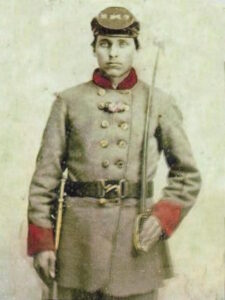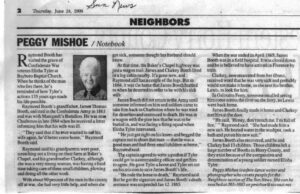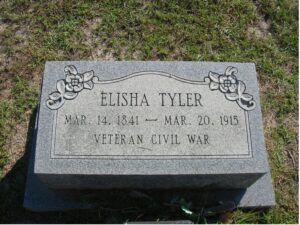Submitted by Rebecca Allen Bruce, Tonya C. Tyler and Judge James Floyd Ammons, Jr. (Great-Great-Grandchildren of Elisha Jackson Tyler); Researched and written by Cheri Todd Molter and Kobe M. Brown
 Elisha Jackson Tyler was born on March 14, 1841, in Columbus County, North Carolina. He was the son of John Jackson Tyler and Elizabeth Ann Soles Tyler. As an adult, Elisha relocated to Horry County, South Carolina. In 1860, Tyler married Amelia Ann King, and the couple had ten children.
Elisha Jackson Tyler was born on March 14, 1841, in Columbus County, North Carolina. He was the son of John Jackson Tyler and Elizabeth Ann Soles Tyler. As an adult, Elisha relocated to Horry County, South Carolina. In 1860, Tyler married Amelia Ann King, and the couple had ten children.
On July 11, 1862, Elisha enlisted in the Confederate army at Charleston, South Carolina. Military records classify him as a private in Company B of Manigault’s Battalion, South Carolina Artillery, and a bugler for Company A of Alston’s Battalion, which was organized under Manigault’s Battalion. Tyler was wounded in action in August 1863 and suffered a concussion. He recovered and returned to serve with his company in September.
The following year, in 1864, Elisha was said to have been responsible for saving a fellow soldier’s life. Booth family lore credits Elisha Tyler with saving their patriarch, James T. Booth, from being executed for desertion. Booth’s military records verify that he was reported absent as of Sept. 20, 1864, and the muster roll from November/December shows that Booth was “under arrest awaiting sentence of G.C.M. [General Court Martial].” The final record of Booth’s file reads “sentence of death suspended.”
 Now, what role did Elisha Tyler play in Booth’s suspended death sentence? Well, that’s the part that oral tradition and an article in the June 24, 1999, edition of Sun-News has filled in. According to Raymond Booth, grandson of James Booth, his grandfather had enlisted in the Confederate army in 1863 and served in Manigault’s Battalion. He was near Charleston in late 1864 when he received a letter informing him that his wife, Clarkey Booth was ill. He was told that if he ever wanted to see her again, he’d better come home. He returned to his farm in Baker’s Chapel, South Carolina, near present-day Aynor, without leave, to be with his wife and three small children.
Now, what role did Elisha Tyler play in Booth’s suspended death sentence? Well, that’s the part that oral tradition and an article in the June 24, 1999, edition of Sun-News has filled in. According to Raymond Booth, grandson of James Booth, his grandfather had enlisted in the Confederate army in 1863 and served in Manigault’s Battalion. He was near Charleston in late 1864 when he received a letter informing him that his wife, Clarkey Booth was ill. He was told that if he ever wanted to see her again, he’d better come home. He returned to his farm in Baker’s Chapel, South Carolina, near present-day Aynor, without leave, to be with his wife and three small children.
A few weeks later, Booth was arrested and returned to Charleston. He was tried for desertion, convicted, and sentenced to death. It was said that Booth was riding in a wagon with the pine box that he was to be buried in and was facing a firing squad when Elisha Tyler intervened on Booth’s behalf. Elisha got down on his knees, begging the captain to spare Booth’s life, insisting that Booth was a good man who had three small children at home who needed him.
As a result of Elisha’s efforts, the captain stated that he would write a pardon for Booth if Tyler could find a commanding officer who would agree. The captain gave Elisha a horse and he rode off to get the signature needed to save Booth’s life. He got the signature and Booth’s death sentence was suspended on January 12, 1865.
James Thomas Booth survived the war and returned home to his wife and their three children. They eventually had ten more children, including Raymond Booth’s father. Those children left many Booth descendants in Horry County, many of whom remain grateful to Elisha Tyler, for their existence. Tyler’s compassion and determination were not forgotten.
This compassion was a lifelong character trait of Elisha. In interviews with several of his grandchildren, all of whom personally knew him, they spoke of a man who cared about his family, his neighbors, and his community. They said he was a kind, respectful, and thoughtful man, who would share his crops and food with anyone in need. He stuck his neck out for Mr. Booth because he cared about everyone. He did not want Mr. Booth’s children to be fatherless. Elisha could have walked away. He did not.
 Elisha Tyler also survived the war. After the war, he owned and operated a grist mill that supported his family and the other residents of Horry County, South Carolina. His wife, Amelia Ann, passed away in 1906. He married Rhoda (Rhodia) Elizabeth Soles later that same year. Elisha Jackson Tyler died on March 20, 1915, at the age of 74. He is buried in the Bayboro Baptist Church Cemetery. A small bridge in Horry County, SC, is named in his honor.
Elisha Tyler also survived the war. After the war, he owned and operated a grist mill that supported his family and the other residents of Horry County, South Carolina. His wife, Amelia Ann, passed away in 1906. He married Rhoda (Rhodia) Elizabeth Soles later that same year. Elisha Jackson Tyler died on March 20, 1915, at the age of 74. He is buried in the Bayboro Baptist Church Cemetery. A small bridge in Horry County, SC, is named in his honor.
Elisha’s father, John Jackson Tyler of Columbus County, North Carolina, also served in the Confederate army. John J. Tyler was in Company A of South Carolina 2nd Artillery. He enlisted at Fort Johnson on March 20, 1862. According to his military records, he was taken prisoner sometime after October 1864, and was released on May 23, 1865, at Augusta, Georgia. Three of Elisha’s brothers—Hugh Tyler, Moses Tyler, and Everett Tyler—also served in the Confederate army.
